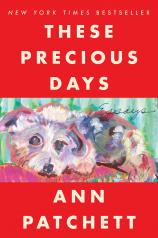These Precious Days: Essays
Review
These Precious Days: Essays
When I reviewed Ann Patchett’s first nonfiction collection, THIS IS THE STORY OF A HAPPY MARRIAGE, in 2013, I observed that readers shouldn’t be surprised if they had the sensation that, instead of consuming written words, they were sharing a conversation with their wisest, most humane friend. If anything, that feeling emerges more strongly with THESE PRECIOUS DAYS, her insightful and warm new volume of assorted prose.
Patchett’s book gathers a plentiful selection of essays, reviews and lectures, most of which have appeared in publications that include the New Yorker, the New York Times and Harper’s Magazine. As is true of her fiction, her writing is graceful and unpretentious, and she possesses a refreshing self-deprecating quality when examining her own thoughts and actions.
The themes of family and friendship predominate, their emotional resonance heightened by Patchett’s keen appreciation of the precariousness of these intimate relationships in the face of life’s fragility. In the opening essay, “Three Fathers,” she profiles her birth father and two stepfathers and their markedly different relationships to her and her writing. She returns near the end of the book to her father --- a retired Los Angeles police officer whose work involved him in the aftermath of Robert Kennedy’s assassination and the Charles Manson case --- to share her thoughts on his passing.
"As is true of her fiction, [Patchett's] writing is graceful and unpretentious, and she possesses a refreshing self-deprecating quality when examining her own thoughts and actions."
“Flight Plan” is an affectionate, occasionally wry account of her husband Karl VanDevender’s passion for flying, blending admiration for his skill with trepidation over her realization that there is “no keeping anyone safe.” Patchett reminisces about the summer she spent in Europe as a 19-year-old in 1983 with her friend, Marti, and recounts a lifelong friendship “full of elasticity and trust” with her friend, Tavia. And in the frank “There Are No Children Here,” she discusses the implications of her decision not to have children.
The climax of these preoccupations arrives in the moving novella-length title piece, where Patchett portrays her uncommon friendship with Sooki Raphael, Tom Hanks’ assistant. The pair met at an event in Washington, D.C. that resulted from the blurb Patchett casually provided for Hanks’ short story collection. A year of increasingly warm email correspondence followed before Sooki informed Patchett that she was suffering from advanced pancreatic cancer.
After a brief period of remission, Sooki’s cancer returned to her liver. Thanks to Patchett’s husband, she was enrolled in a clinical trial in Nashville and moved into the basement of the writer’s home just as COVID lockdowns were beginning in March 2020.
Patchett’s account is a radiant, but painfully honest, description of how these “affectionate strangers” bonded over their twice daily hour-long sessions of Kundalini yoga and meditation and at least one other experience, the weirdness of which won’t be spoiled by describing it here. Sooki resumed the painting she had abandoned for many years (two of her works are featured on the front and back covers of the book) and experienced profound growth amid the ordeal of her chemotherapy regimen and the peril of her grave illness.
Sooki’s story closes with the vivid description of a joyful day at a California beach and the opening of an art gallery exhibit of her paintings. “We all know what the end will be now, we’ve known it for a while,” Patchett writes of their improbable friendship at the moment of their parting. “If an ending could be changed through strategic planning or force of will or the sheer love of life, things would go differently, but this cannot be changed.”
Admirers of Patchett’s fiction will enjoy “To the Doghouse,” in which she describes how Charles Schulz’s Snoopy has influenced important aspects of her writing career, as well as “The Nightstand,” in which she reluctantly revisits a cache of short stories lovingly preserved by her mother and father’s meticulous documentation of her literary career. Ever generous, she offers warm appreciations for the work of Eudora Welty and children’s book author Kate DiCamillo.
In an essay entitled “What the American Academy of Arts and Letters Taught Me About Death,” Patchett acknowledges one of her literary idols, John Updike, even as she recognizes that his “work was now irretrievably out of fashion.” And her address to an association of graduate school deans in the humanities describes how the MFA she received from the Iowa Writers’ Workshop in the 1980s showed her less about writing than it did about “the importance of community,” and how it helped her discover that “my truest destiny was a thing I never saw coming.”
In its recounting of many closely observed moments, both sublime and mundane, THESE PRECIOUS DAYS eloquently charts some of Ann Patchett’s passage through life. The glimpses she provides of these joys and sorrows might serve as touchstones for any of us as we experience similar moments of our own.
Reviewed by Harvey Freedenberg on November 24, 2021
These Precious Days: Essays
- Publication Date: November 1, 2022
- Genres: Essays, Nonfiction
- Paperback: 336 pages
- Publisher: Harper Perennial
- ISBN-10: 0063092794
- ISBN-13: 9780063092792




